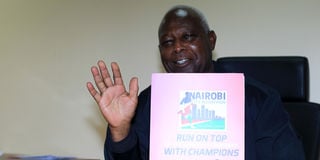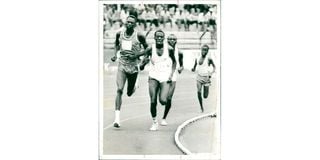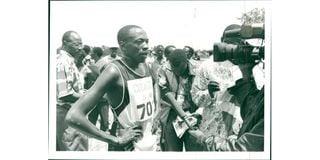Revisiting the controversial doping case that cost Ngugi nearly Sh9.36m

Athletics Kenya President Jackson Tuwei speaks to journalists after Uhuru Classic Nairobi City Marathon planning meeting at Nyayo National Stadium on May 3, 2022.
What you need to know:
- The position of the military was that none of its athletes had been informed of the new out-of-season drug testing
After contacting Major (Rtd) John Karanja whom the Kenya Army wanted to help the 1988 Olympics 5,000 metres champion John Ngugi, during the athlete’s trial, he sent me a detailed e-mail to clear the air on the matter as follows:
“Greetings Sir, and apologies for the delay.
Early in 1993, following the imposition of the four-year ban by IAAF (now World Athletics) following John Ngugi’s alleged “refusal” to submit to the then new “out-of-season drug testing”, I was tasked by General Lenges, then Kenya Army Commander, to ensure that the innocent hero of the Kenya Army was treated fairly.
I attended the Board meeting appointed to inquire into the matter at the Nyayo Stadium. I clearly remember that the assisting counsel was Mr Philip Murgor. The position of the military was that none of its athletes had been informed of the new out-of-season drug testing. We went through the process but we were never informed of the outcome. Following this delay, John Ngugi’s agent, Mr John Bicourt, then decided to appeal the matter to the IAAF then “Arbitration Panel.”
“I do recall that towards the end of that year, Ngugi and I were summoned to the office of the then chairman of KAAA (Athletics Kenya’s forerunner Kenya Amateur Athletics Association), the late Isaiah Kiplagat. When we arrived at his Post Bank office, we met General (then Colonel) Jackson Tuwei who was the vice chairman of KAAA at the time. Col. Tuwei then asked Ngugi to withdraw his appeal to which Ngugi flatly declined. Col Tuwei then entered Kiplagat’s office and shortly afterwards we were ushered into the office where we found Kiplagat breathing fire. He called Ngugi many unprintable words and literally chased us out of his office.

Athletics Kenya President Jackson Tuwei speaks to journalists after Uhuru Classic Nairobi City Marathon planning meeting at Nyayo National Stadium on May 3, 2022.
We then headed to Monte Carlo, Monaco where IAAF offices were located. We boarded the same flight with the KAAA officials who included the then Secretary-General David Okeyo, and I believe Col Tuwei was there as well. KAAA had also secured the services of a prominent Nairobi Lawyer, Mr James Oduol. I mentioned to the Lawyer that we were alighting at Charles De Gaulle Airport, Paris then head to London to prepare our case and link up with Brigadier Murunga who was the chairman of Armed Forces Athletics at the time, and who had categorically informed the board earlier that Armed Forces athletes had not been informed of this out-of-season drug testing. We were also to meet lawyers whose services had been secured by Bicourt.
Our journey to London was however interrupted and we eventually arrived at Heathrow Airport at 1400hrs just in time to board our flight to Nice. We were therefore unable to contact Brigadier Murunga.
We were of course exhausted by the time we arrived in Monte Carlo.
The following morning, we went to IAAF for the hearing. We were shocked when David Okeyo shamelessly lied that KAAA had informed all Kenyan athletes about the new out-of-season drug testing. Of course, Ngugi had no witness. On my part I was surprisingly appointed Ngugi’s “interpreter” and hence could not testify on his behalf.

John Ngugi (right) leads Moses Tanui in a local race on June 17, 1988.
To date I am aware that Ngugi has never been supplied with the proceedings and ruling of the KAAA Board nor the IAAF proceedings and ruling. This is very unfair to Ngugi who is still cited as Kenya’s first drug cheat! General Tuwei, now President of Athletics Kenya, must put the record straight.
Indeed after you requested me to give my account on this matter, I Googled and discovered that KAAA appears to have ruled in favour of Ngugi and had actually “revoked” the IAAF ban. (see attached document at page 578-9)”.
Regards,
Maj. (Rtd.) John Karanja”
The ruling Maj. (Rtd.) Karanja is referring to is attributed to the document “The Drug Testing Project in International Sports: Dilemmas in an Expanding Regulatory Regime” written by James B. Jacobs and Bruce Samuels.
The document has hundreds of pages and John Ngugi’s part is on pages 578-9 which says: “Olympic and five-time world cross country champion John Ngugi of Kenya was banned for four years by the IAAF testing team, which tracked him down in Kenya, did not identify themselves and that as a member of the Kenya Army, he could not submit to a urine test without the authority of the Army. The report quotes Reuters story titled “Athletics – Ngugi to Fight IAAF Doping Ban.”
For example, when the IAAF suspended world champion runner Ngugi, who is also five-time world cross country champion, for four years for refusing to submit to an out of competition drug test, the Kenyan federation ‘revoked’ the four-year ban.
Under an international system, officials would have to allow international testing agents to enter the country upon short notice and cooperate in locating and contacting athletes. Of course, athletes could be banned from competition if cooperation from their countries was not forthcoming, but would it be fair to punish athletes for the recalcitrance of their national sports associations?
Moreover, charging and disciplining a country for “lack of cooperation” might turn out to be difficult. For example, the United States Olympic Committee (USOC) feared that the Chinese would boycott the 1996 Olympics because all Chinese swimmers were prohibited from participating in an important meet in August 1995 due to seven positive tests results in 1994 and 1995.
There are also information obstacles.

John Ngugi is interviewed after the senior men's race during the National Cross-Country Championship at the Ngong Racecourse on Feb 17, 1996. Ngugi finished 96th out of 261 athletes but officials and athletes described his performance as promising.
If athletes are not fully informed about which substances are banned, deterrence will be infective and athletes may be punished for taking banned substances inadvertently. Athletes have to be kept informed about a constantly growing list of banned substances (already numbering 3,000 substances) and the common pharmaceutical items (and possibly foods and beverages) in which those substances are found. The complexity of tracking all the banned substances requires athletes and coaches to be amateur pharmacologists.
Now that the truth about Ngugi’s tribulations are known, let someone come out and tell all Kenyans and the rest of the world how he will recover the US$80,000 (around Sh9.368 million in today’s exchange rates) he lost fighting for justice. Man cannot live on talking alone.




